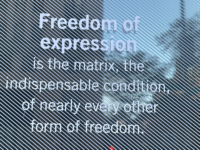Last week, I wrote about Liberal MP Lisa Hepfner’s comments at the Heritage committee study into Bill C-18, as she dismissed a proposed Conservative amendment by offering a misleading take on CRTC regulation of the news and stating that online news outlets are “not news.They’re not gathering news. They’re publishing opinion only.” Those comments unsurprisingly sparked anger from many online news outlets, leading to an apology from Hepfner in which she said that Bill C-18 will support digital journalists in their work. Yet a day later, the committee was back at clause-by-clause review and while Hepfner remained silent, her colleagues voted down an amendment proposed by online news services which re-affirms that action speaks louder than words.
 Articles by: Michael Geist
Articles by: Michael Geist
The Law Bytes Podcast, Episode 148: Christelle Tessono on Bringing a Human Rights Lens to AI Regulation in Bill C-27
Bill C-27, the government’s privacy and artificial intelligence bill is slowly making its way through the Parliamentary process. One of the emerging issues has been the mounting opposition to the AI portion of the bill, including a recent NDP motion to divide the bill for voting purposes, separating the privacy and AI portions. In fact, several studies have been released which place the spotlight on the concerns with the government’s plan for AI regulation, which is widely viewed as vague and ineffective. Christelle Tessono is a tech policy researcher based at Princeton University’s Center for Information Technology Policy (CITP). She was one of several authors of a joint report on the AI bill which brought together researchers from the Cybersecure Policy Exchange at Toronto Metropolitan University, McGill University’s Centre for Media, Technology and Democracy, and the Center for Information Technology Policy at Princeton University. Christelle joins the Law Bytes podcast to talk about the report and what she thinks needs to change in Bill C-27.
Dismissing Digital News Outlets: Liberal MP Claims Online News Services Don’t Report News
Since its introduction last spring, online news outlets have expressed fears that Bill C-18, the Online News Act, will primarily benefit large incumbent news organizations. Those concerns grew once the Parliamentary Budget Officer estimated that more than 75% of the revenues would go to broadcasters such as Bell, Rogers, and the CBC. After Postmedia and Torstar collect their share, there may be little left for innovative online startups. The government has seemingly tried to ignore those startups with Canadian Heritage Minister Pablo Rodriguez talking about 400+ news outlet closures since 2008, but neglecting to refer to the hundreds of new outlets that have sprung up during the same period.
During the clause-by-clause review of Bill C-18, Liberal MP Lisa Hepfner, herself a former journalist, provide a stunning illustration of how the government only views incumbent news outlets as worthy of support. Responding to a proposed Conservative amendment to the bill, Hepfner stated:
No Billion Dollar Bonus: Officials Admit Most Bill C-11 Funding Isn’t New and Will Still Be Controlled by Foreign Streamers
Canadian Heritage Minister Pablo Rodriguez and department officials appeared before the Senate Committee on Transport and Communications yesterday on Bill C-11. I posted a Substack of my live tweeting of the Minister’s appearance, which included continued gaslighting on the applicability of the bill to user content and an acknowledgement that it could lead to algorithmic manipulation. After Rodriguez departed, officials took questions for another hour. One of the most notable exchanges involved the express admission that the much-touted estimate that the bill would generate a billion dollars is massively overstated. In fact, department officials now admit that most of that money isn’t new at all. Rather (much as I’ve argued), it is simply a re-allocation of existing expenditures in Canada that is unlikely to result in significant increased economic activity or new jobs.
Freedom of Expression is Not A Loophole: Responding to the Government’s Inaccurate Defence of Mandated Payments for Links in Bill C-18
The Standing Committee on Canadian Heritage opened its clause-by-clause review of Bill C-18 on Friday with some extensive questions about the scope of coverage of the bill and the opportunity to vote on several amendments. The meeting finally provided the chance to ask department officials for their views on key questions, including whether the government believes that services such as Reddit and Twitter are caught by the law (the answer was yes they are digital news intermediaries, but may not be sufficiently dominant to be required to negotiate mandate payments). The most important moment in the hearing came toward the end, when Conservative MP Rachael Thomas moved an amendment to exclude links from the scope of the definition of news content. That approach would still ensure that news publishers are covered for uses of their work such as republication (which is precisely what most would envision) but safeguard the foundation of the free flow of information on the Internet.











